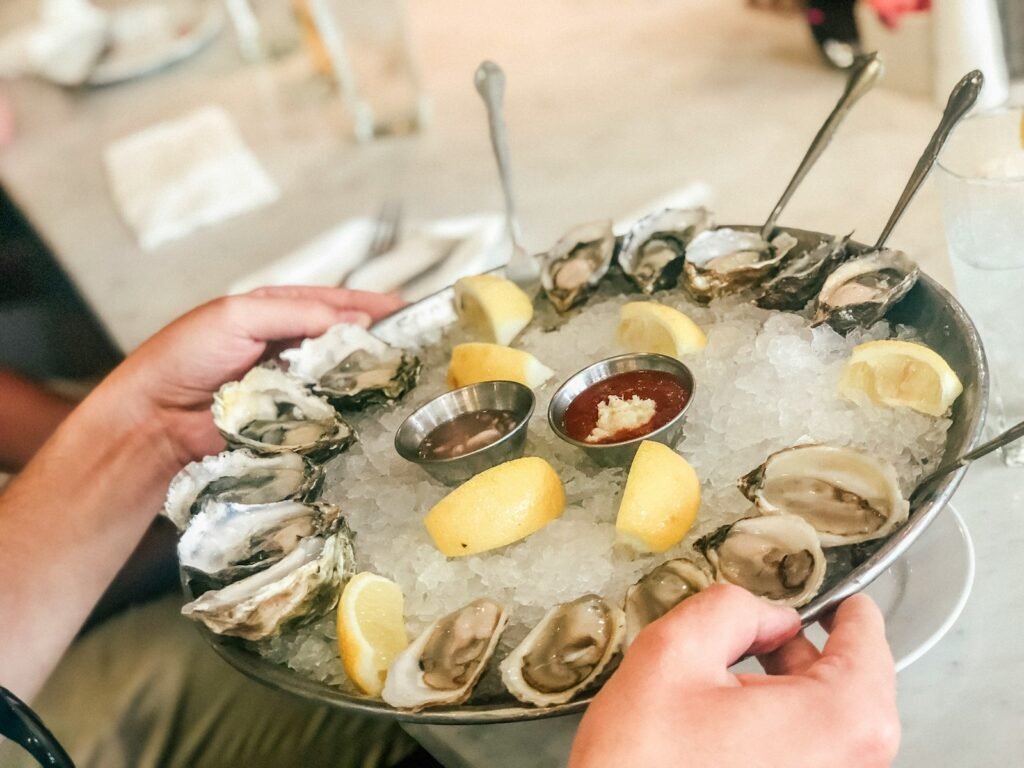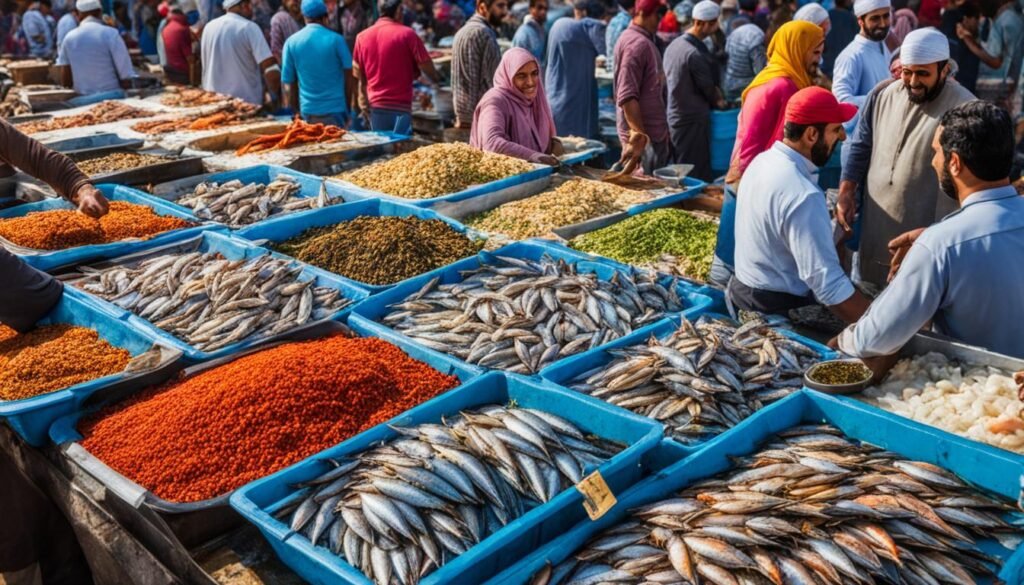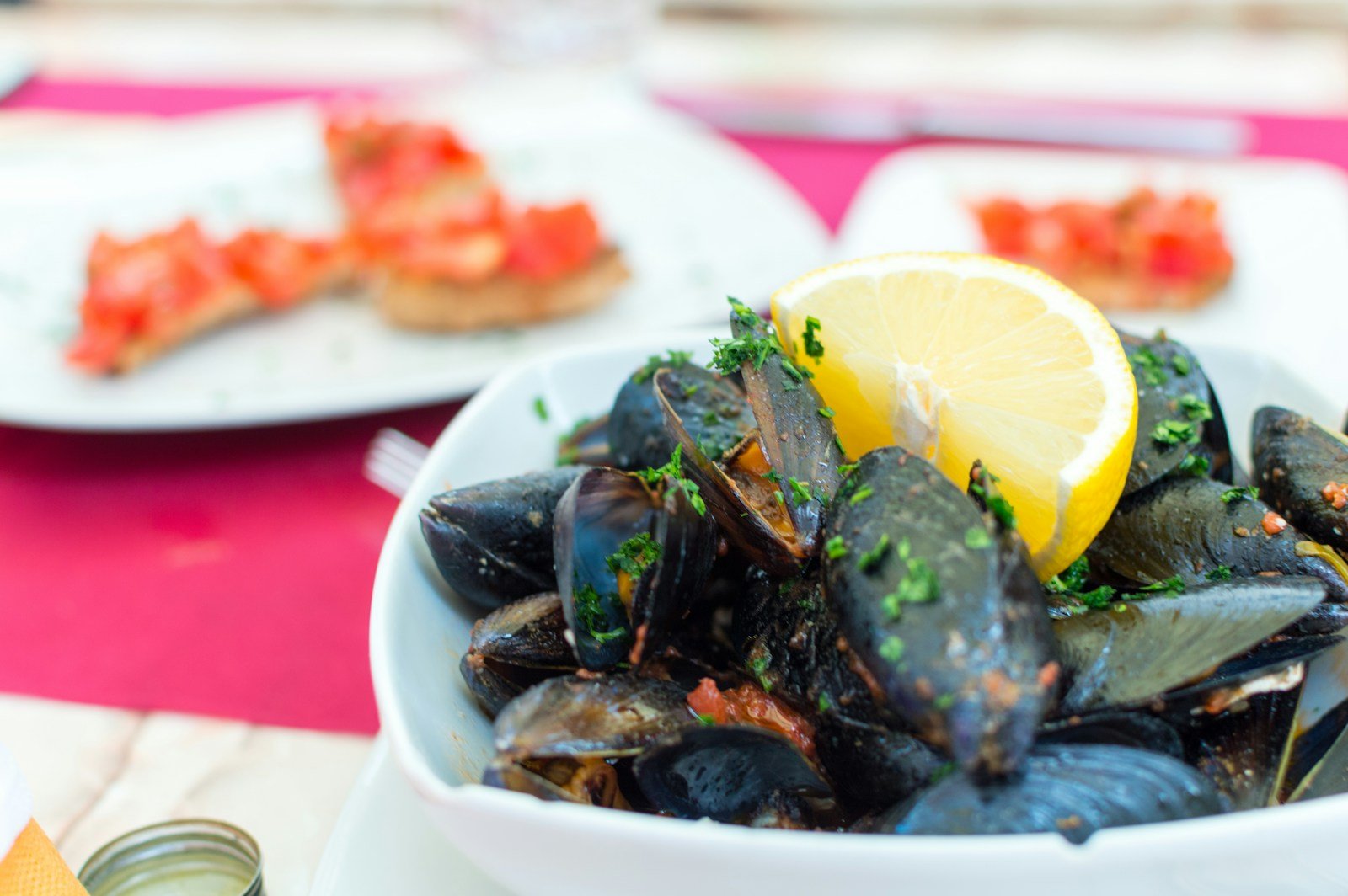As we explore the world’s diverse food traditions, a question comes up: Can Muslims eat shellfish without breaking their beliefs? The mix of Islamic dietary laws and seafood brings up complex ideas. This piece looks into if shellfish is okay in Islam, the difference between halal and haram, and how different thoughts affect it. We also see how seafood matters in Muslim cultures. We aim to make things clear about eating shellfish in a faith that values careful eating.

Understanding Halal and Haram in Islam
In Islam, the terms halal and haram guide what foods are okay or not okay to eat. Halal means lawful and okay, while haram means forbidden. These rules come from Islamic dietary laws based on Quranic guidance.
The Quran teaches the importance of eating what is lawful. For instance, verse 2:168 talks about eating lawful and good foods. Verse 5:96 also talks about eating sea creatures, showing they are okay for Muslims to eat.
Knowing the difference between halal and haram helps Muslims make good food choices. It looks at ethics, health, and spirituality. Following these rules makes sure food choices match with religious beliefs. This brings Muslims closer together in community and faith.
Islamic Dietary Laws and Guidelines
Islamic dietary laws come from the Quran and Hadith. They guide Muslims on what foods to eat. These laws say not to eat dead animals, blood, or things from swine, as the Quran says in 2:173. Animals like cattle, sheep, and goats are okay to eat if they are treated right and killed in a kind way.
Sharia law requires a quick and painless way to kill animals called Dhabīḥah. This means cutting deep in the animal’s throat. Drinking alcohol, eating pork, or meat from wild animals is not allowed. Seafood is usually okay to eat, as the Quran says in 5:96. Even if fish is found dead, it’s still good to eat, as Hadith says.
There are different views on seafood in Islam. Some think crustaceans like shrimp and crab are not allowed, but others say they can be eaten. Now, more people are okay with eating halal seafood. It’s important to treat animals well and get seafood from good sources.
Cultural Significance of Seafood in Muslim Countries
Seafood is a big part of the food culture in many Muslim countries. It shows a deep connection to their heritage. Coastal communities use fish and other sea foods as main sources of protein.
This shows how seafood fits well with halal standards. It helps balance tradition with religious rules.
In many Muslim-majority areas, seafood is a key part of special meals. These meals bring families and communities together. They help keep cultural bonds strong.
Restaurants and homes offer many seafood dishes. This mix shows a blend of local tastes and outside influences.

Seafood also plays a big role in Muslim celebrations and rituals. People look for seafood with halal certification. This ensures it meets Islamic dietary laws.
This focus on ethical seafood choices deepens people’s respect for their food. It connects them to their culinary heritage and religious beliefs.
Are All Types of Fish Halal?
Islamic scholars have different views on what makes fish halal. Generally, fish with scales are seen as halal. Those without scales are often up for debate. For instance, the Sunni Hanafi school says fish like eel and croaker are okay to eat. But, prawns, lobsters, and crabs are mostly seen as makruh, or not recommended.
On the other hand, Shia Ja’fari scholars say fish with scales are halal but those without are not. Some crustaceans like shrimps are okay to eat, but crabs are not. This leads to different eating habits among Muslims.
The Quran, in Surah Al Maida 5:96, says all sea game is halal for Muslims. But, this leads to more debate among scholars. Some, like Maliki, only allow fish with scales, gills, and fins. Shafi’i avoids some creatures. Still, what’s considered halal fish can vary a lot.
Can Muslims Eat Shellfish
Many Muslims wonder if they can eat shellfish. It’s important to know what shellfish definition means. Shellfish includes many sea animals like crustaceans and mollusks. These animals have different views in Islamic teachings.
Defining Shellfish within Islamic Context
Islamic scholars have different views on shellfish. Most agree that shrimp is okay to eat. But, opinions on crab, lobster, and other mollusks vary. Some use the Quran to say shrimp is good to eat because it’s clean.
This shows how different groups see shellfish in their own ways. They all follow the rule of eating only halal foods.
Different Interpretations Among Islamic Scholars
Scholars from Sunni and Shia traditions have their own views. Sunnis usually think most seafood is fine to eat. But, Shias often say all shellfish are not allowed.
The Hanafi school is interesting too. They allow some fish but not crustaceans. These debates show how complex Islamic rules on food can be. They also show the deep thought on eating sea creatures.
Specific Types of Shellfish and Their Status
There are different views on whether certain shellfish are halal or haram among Muslim scholars. This variety is important for those making dietary choices. It’s especially true for foods like lobster, crab, shrimp, oysters, and mussels.
Is Lobster Halal or Haram?
Opinions on lobster being halal or haram vary. Some say it’s haram because it’s a scavenger. But, others like Sheikh Ahmad Kutty believe it’s halal. This shows the need for personal research before deciding to eat lobster.
Is Crab Halal or Haram?
Crab’s halal status is also debated. Some think its scavenger nature makes it haram. Yet, in Hanafi jurisprudence, there’s a view that allows eating crabs. This shows there are different opinions on this shellfish.
Is Shrimp or Prawns Halal or Haram?
Shrimp is generally seen as halal in Islamic dietary laws. Scholars say it’s like fish and is okay to eat. This view makes shrimp and prawns more acceptable in halal diets.
Understanding the Status of Oysters and Mussels
Oysters and mussels have different halal statuses in Islamic thought. The Hanafi school says mussels are halal. But, other schools like Maliki, Shafi’i, and Hanbali might not agree, calling them makruh or haram. Oysters also have mixed opinions, affecting their place in halal diets. Muslims should think about their beliefs and what scholars say when choosing what to eat.
The Stance of Different Islamic Schools of Thought
Islamic schools of thought offer different views on seafood for Muslims. The Hanafi school is strict, only allowing fish with scales. On the other hand, the Shafi’i school, along with Maliki and Hanbali, is more open, accepting almost all seafood as halal.
About 20% of Islamic scholars follow the Hanafi view. Most others believe in a wider range of seafood. This comes from different readings of Quranic verses about seafood. The Shafi’i school, for example, says all sea creatures are halal.
The Hanafi view is supported by scholars like Abu Hanifah and others. They have a detailed understanding of what is allowed in food. They say some seafood is okay but not all, based on the Quran and what Prophet Muhammad said.
But the Shafi’i, Maliki, and Hanbali schools disagree, saying all seafood is okay but some need extra checking. This shows a big debate among Islamic scholars. It also shows how local views and culture affect what Muslims eat. People often ask experts to help them choose halal seafood.
Ethical Considerations in Consuming Seafood
Eating seafood ethically is important, especially when considering animal welfare in Islam. Islamic teachings stress compassion and respect for all living beings, including sea creatures. This means being careful about where seafood comes from and how it’s caught or farmed.
Choosing sustainable and humane options is key for believers. It helps with both environmental care and sticking to Islamic values.
The Importance of Animal Welfare in Islam
Islam values animal welfare, backed by the Quran. Halal certification means the food meets Islamic standards, from catching to eating. This includes how fish and seafood are raised or caught.
It’s crucial for Muslim consumers to pick seafood that’s both good for the planet and right by Islamic beliefs. This way, their meals are not just healthy but also align with their faith.
The Role of Halal Certification in Seafood Selection
Halal certification is key to making sure seafood follows Islamic dietary laws. For many, halal certification means they can trust the seafood they buy. It checks the seafood from where it comes from to how it’s made.
More people want to trust the seafood they buy, especially with items that aren’t fresh. This need shows how important clear labels and trusted certification are. With the halal food market expected to hit USD 9.33 billion by 2026, businesses see the worth of getting certified to meet Muslim dietary needs.
Halal certification affects more than just seafood. It shows a commitment to ethics in the food world, building trust with consumers. Halal and kosher diets both need strict rules, making seafood producers focus on being halal. This builds trust and keeps customers coming back.
Popular Seafood Dishes in Muslim Cuisine
Seafood is a big part of Muslim cuisine, showing off a mix of cultural traditions and flavors. In South Asia, spicy fish curries are a big hit. They bring together the rich tastes and textures of the region.
In the Middle East, grilled fish with spices is a common dish. It’s often eaten with family during big meals. Near the coast, fresh seafood lets chefs make dishes that are tasty and good for you. These dishes often include shrimp, which is seen as halal by many, even if there are different views on it.
Crabs are another seafood that gets different opinions in Islamic teachings. Some say it’s okay to eat, while others are unsure. The Quran says that seafood from the sea is okay to eat, which guides many cooks in their recipes.
In places like Malaysia, seafood is a big part of everyday meals. Here, dishes with lobsters and crabs are very popular. This shows how different schools of thought affect what people eat.
Seafood in Muslim cuisine shows the deep link between food and culture. Sharing seafood meals brings people together. It connects generations through traditions and flavors that mean a lot to them.
Implications of Global Supply and Processed Seafood
The global seafood supply chain has big halal concerns for Muslim consumers. Countries like the United States get about eighty percent of their seafood from other countries. This means they often rely on processing facilities in places with poor labor conditions.
At least a thousand Uyghurs have been moved to seafood-processing jobs in Shandong since 2018. This shows the serious issues with labor in the seafood processing industry.
There’s also a big risk of non-halal additives getting into seafood. This makes it hard to keep seafood halal. Now, there’s a big push for more transparency and ethical sourcing in seafood.
Customers want seafood that meets strict halal standards. This is pushing suppliers to be more ethical in their seafood trade. With the global halal market worth over US$150 billion, getting seafood right is crucial.
Nations like Malaysia are leading in halal seafood production and trade. It’s important for the seafood industry worldwide to follow their example. This ensures seafood is both ethical and meets religious standards for all consumers.
FAQ
Can Muslims eat shellfish?
What are the Islamic dietary laws regarding halal and haram foods?
Are all fish considered halal in Islam?
What is the significance of seafood in Muslim-majority countries?
What types of shellfish are specifically addressed in Islamic texts?
How do different Islamic schools of thought interpret seafood consumption?
Why is ethical consumption important in Islam?
What role does halal certification play in seafood selection?
What are some popular seafood dishes in Muslim cuisine?
What are the implications of global seafood supply on halal status?

Embracing Faith, One Insight at a Time!
The teachings of the Quran have always guided my path. With a deep passion for Islamic knowledge, I strive to blend the wisdom of tradition with the relevance of today, making the timeless messages of Islam accessible and meaningful for everyone.
Muslim Culture Hub is my platform to share historical insights and thought-provoking articles, exploring both well-known and lesser-discussed aspects of Islamic culture and beliefs. My mission is to create an inclusive online space where everyone can learn, strengthen their faith, and connect with the profound message of Islam.
Join the journey!
May peace be upon you.








